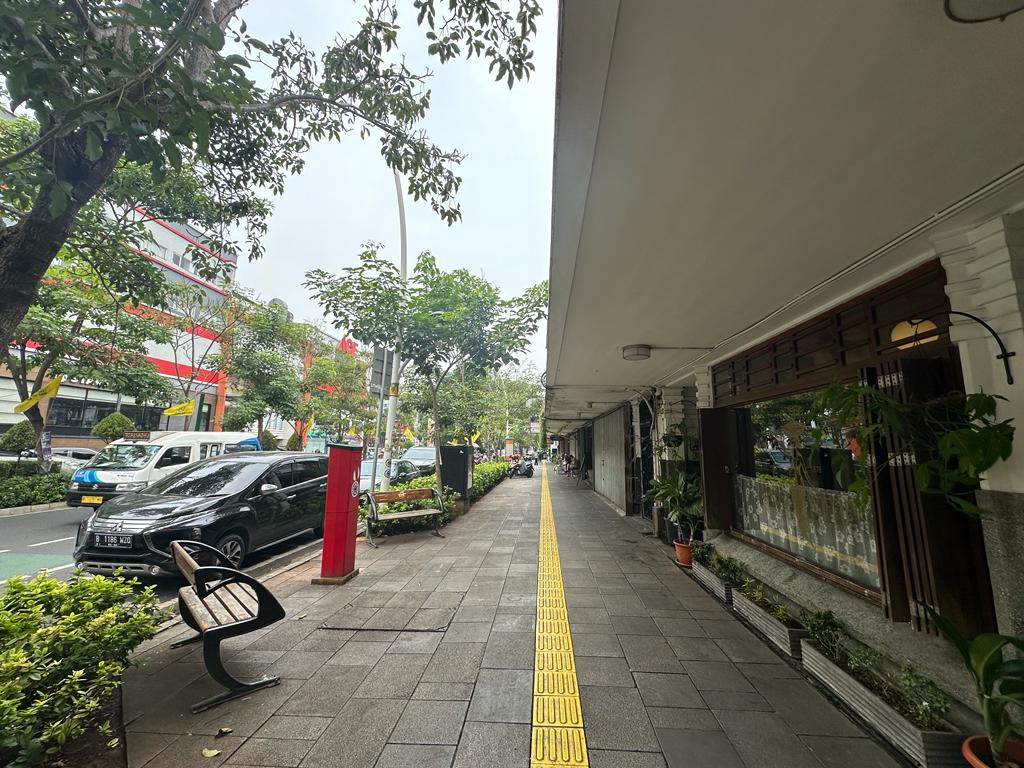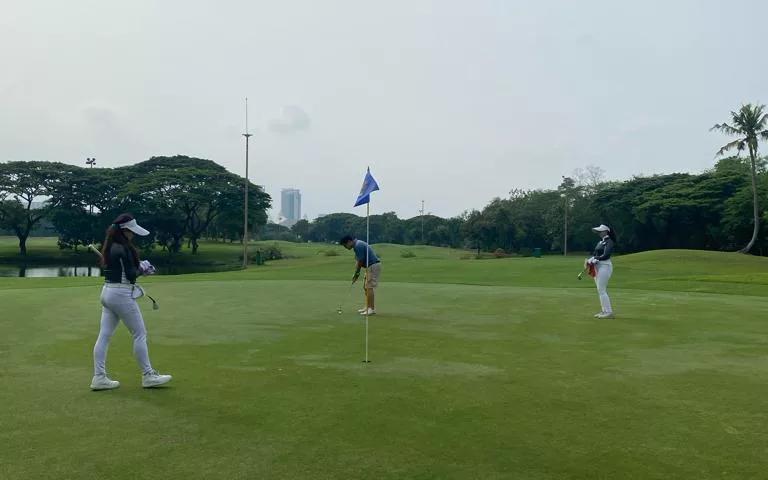
That day, I strolled along the main road of Cikini around Menteng. Jakarta’s weather was neither too hot nor rainy. It seemed as if the capital was in a good mood.
Quietly, I admired the colonial architecture still present in the Cikini area. The cafe’s interior and the sidewalk were only separated by a glass window. I began to imagine how Dutch ladies in that era would leisurely drink tea, sip coffee, and exchange gossip, without the rush of work or the immediacy of WA messages or emails demanding immediate responses. Honestly, in that moment, a feeling of jealousy emerged within me.
Engrossed in my own thoughts, out of nowhere, an old man approached and said:
“Sir, I’m actually embarrassed to say… I need a little bit of money to go home by train from Gondangdia station. But my wallet is completely empty, sir. Please help me get home.”
I sensed a tone of despair from the man when he showed me his tattered, empty wallet.
Perhaps due to my preoccupied mind, I automatically mustered a “Sorry, sir…”, assuming it was another one of those frauds in my beloved Jakarta.
As if he could read my mind, the slight look of desperation on the man’s face immediately turned into one of disappointment as he apologised, “I’m sorry for disturbing you, sir… I really am.”
Just like that, the man shook his head and walked away. It was hard to guess why the man shook his head. What was he feeling? Who knows?
About five minutes later, a wave of regret slowly washed over me. I felt something odd, something unusual. The man didn’t force me. In fact, he apologised. A single glance at his eyes confirmed that he was embarrassed to do so. Or maybe he’s a great actor. Who knows?
Stricken with confusion and regret, I turned around to look for the man. But he had disappeared, as if he were a ninja.
So I let out a sigh, turned around again, and continued my journey. However, this time, I didn’t gaze at the beautiful Dutch-styled window displays along Cikini road. The only thing I could picture was the man’s gloomy face, which continued to resurface in my mind. I kept asking myself, “What if the man really couldn’t come home?”
I should have followed my heart more often. Occasionally, I ought to try listening to my inner voice and extend a helping hand to those suffering like the man. However, in my case, it was far too late now.
At times, the fast-paced lifestyle of being a “Jakarta person” can numb our conscience, credited to our frequent experiences of deception and dishonesty. The fear of being taken advantage of often compels us to shut ourselves off from our inner voice. I found myself in a moment of silence, deeply contemplative. However, this time, it wasn’t about the Dutch ladies.
This time, my thoughts shifted to a culture that we face daily. In an organisation whose culture focuses on office politics and backstabbing, members would be busy “building gates” to fortify themselves. In this survival mode, our inner voice often gets ignored. But so what?
On the other hand, in an organisation where members genuinely care for each other and sincerely communicate with each other, we become part of the lives of fellow members of the organisation- in other words, a true community. We all yearn to be part of something greater than ourselves, feel safe and happy, and dare to be ourselves.
This courage to “be ourselves” comes down to the desire to build bridges instead of gates. It involves listening to the whispers of the heart that keep us from becoming overly cautious “Jakarta people”. These whispers from the heart make us willing to be attentive listeners, opening ourselves to the stories of our neighbours.
I try to remind myself that listening with genuine attention and appreciation is the key to good social relationships. It is the foundation for building social bridges—pathways that lead us to happiness, success, good health, and the many joys life has to offer.
Written by Wuddy Warsono, CFA
Share

That day, I strolled along the main road of Cikini around Menteng. Jakarta’s weather was neither too hot nor rainy. It seemed as if the capital was in a good mood.
Quietly, I admired the colonial architecture still present in the Cikini area. The cafe’s interior and the sidewalk were only separated by a glass window. I began to imagine how Dutch ladies in that era would leisurely drink tea, sip coffee, and exchange gossip, without the rush of work or the immediacy of WA messages or emails demanding immediate responses. Honestly, in that moment, a feeling of jealousy emerged within me.
Engrossed in my own thoughts, out of nowhere, an old man approached and said:
“Sir, I’m actually embarrassed to say… I need a little bit of money to go home by train from Gondangdia station. But my wallet is completely empty, sir. Please help me get home.”
I sensed a tone of despair from the man when he showed me his tattered, empty wallet.
Perhaps due to my preoccupied mind, I automatically mustered a “Sorry, sir…”, assuming it was another one of those frauds in my beloved Jakarta.
As if he could read my mind, the slight look of desperation on the man’s face immediately turned into one of disappointment as he apologised, “I’m sorry for disturbing you, sir… I really am.”
Just like that, the man shook his head and walked away. It was hard to guess why the man shook his head. What was he feeling? Who knows?
About five minutes later, a wave of regret slowly washed over me. I felt something odd, something unusual. The man didn’t force me. In fact, he apologised. A single glance at his eyes confirmed that he was embarrassed to do so. Or maybe he’s a great actor. Who knows?
Stricken with confusion and regret, I turned around to look for the man. But he had disappeared, as if he were a ninja.
So I let out a sigh, turned around again, and continued my journey. However, this time, I didn’t gaze at the beautiful Dutch-styled window displays along Cikini road. The only thing I could picture was the man’s gloomy face, which continued to resurface in my mind. I kept asking myself, “What if the man really couldn’t come home?”
I should have followed my heart more often. Occasionally, I ought to try listening to my inner voice and extend a helping hand to those suffering like the man. However, in my case, it was far too late now.
At times, the fast-paced lifestyle of being a “Jakarta person” can numb our conscience, credited to our frequent experiences of deception and dishonesty. The fear of being taken advantage of often compels us to shut ourselves off from our inner voice. I found myself in a moment of silence, deeply contemplative. However, this time, it wasn’t about the Dutch ladies.
This time, my thoughts shifted to a culture that we face daily. In an organisation whose culture focuses on office politics and backstabbing, members would be busy “building gates” to fortify themselves. In this survival mode, our inner voice often gets ignored. But so what?
On the other hand, in an organisation where members genuinely care for each other and sincerely communicate with each other, we become part of the lives of fellow members of the organisation- in other words, a true community. We all yearn to be part of something greater than ourselves, feel safe and happy, and dare to be ourselves.
This courage to “be ourselves” comes down to the desire to build bridges instead of gates. It involves listening to the whispers of the heart that keep us from becoming overly cautious “Jakarta people”. These whispers from the heart make us willing to be attentive listeners, opening ourselves to the stories of our neighbours.
I try to remind myself that listening with genuine attention and appreciation is the key to good social relationships. It is the foundation for building social bridges—pathways that lead us to happiness, success, good health, and the many joys life has to offer.
Written by Wuddy Warsono, CFA
Share



